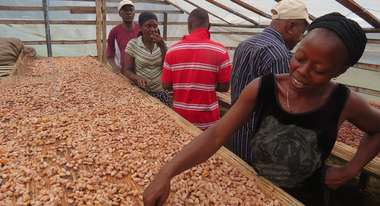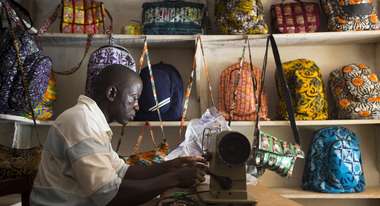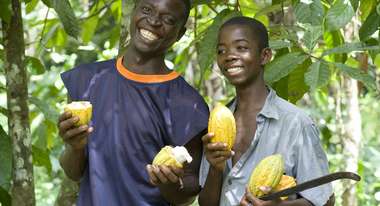Better equipped for the future
In northern Sierra Leone, Welthungerhilfe and its partner organizations are helping to sustainably overcome the problems of lack of money, low-yield agriculture and malnutrition.

In Kaliyereh, a small village in the province of Falaba in northern Sierra Leone, Gbola Mansaray looks out from the terrace of her small house onto the enormous old mango tree, the village's meeting place. The inhabitants hold meetings under the tree to discuss problems and, above all, how the village of just under 500 inhabitants can better position itself for the future. "Life isn't easy here," says the 60-year-old with seven children and seven grandchildren.
Incomes in Sierra Leone are low; around half of the population does not have enough to eat, and, as a result, almost 30 percent of children under the age of five are chronically malnourished and undernourished. The consequences of the COVID-19 pandemic have further worsened the economic situation. The poverty rate is exceptionally high in the south and north of the country, where two-thirds of the population live in poverty.
Balanced nutrition in theory and practice
There are two large sacks of rice in the house's living room. On one is a deep plastic plate, which Gbola Mansaray uses to measure the daily ration. There are two full plates a day for 16 people. "If there's not enough, I go into the forest and look for wild yams," she says. The tuber, which is popular in West Africa, tastes similar to floury potatoes when cooked. But a meal consisting only of rice and yams lacks protein and vitamins, Gbola Mansaray knows. For her, a balanced, nutritious diet is key: "In training courses, we have learned how important fish, meat, eggs and vegetables are."

Employees from MADAM, Welthungerhilfe's (WHH) national partner organization, organized these training courses. Both theory and practicalities matter because a balanced diet is also a question of availability. The families receive vegetable seeds, tips for effective cultivation and small animals for breeding.
Grandmother Gbola Mansaray is now happy to pass on the knowledge she has acquired to other women. "It is particularly important to me that pregnant women eat better. If the mother eats well, she has a better chance of giving birth to a healthy child," she says, looking at her eldest daughter Bambeh Marah—the 30-year-old lives with her family in the house next door. "When my daughter was little, it was difficult for me to get enough food," she remembers. That should no longer happen to any mother today.
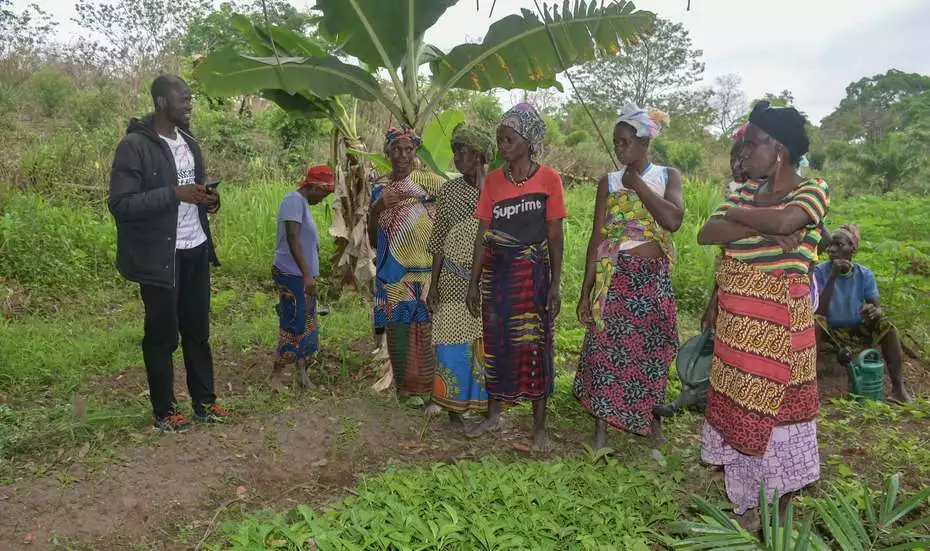
That's why 20 women have planted a vegetable garden together. It takes 15 minutes on foot to get there, through a small forest and across grassland. The group has sown peppers, watermelons, cucumbers, beans and okra, but there is no sign of the hoped-for harvest. A few weeks ago, locusts ravaged the vegetables. Yet everything was so well prepared.
Home-made organic fertilizer
Right next to the garden, there is a new water point for regularly watering the vegetables. Sewa Unisa Samura showed the women how to make their own fertilizer. The agricultural expert from MADAM supervises the activities in Kaliyereh and organizes training courses. "Buying chemical fertilizer would be ecologically inadvisable, far too expensive and time-consuming. What's more, you have to travel all the way to Kabala," says Sewa Unisa Samura.
Instead, the women dug a hole and filled it in layers with organic waste, water, and animal droppings. After a few weeks, they stirred the mixture, and the biofertilizer was ready. Next, they waited for the next crop to be sown in their field.
Throughout the Falaba region, the project reaches around 24,000 people with activities such as agricultural training, the provision of seeds, the construction of wells, new tree nurseries, the promotion of small animal husbandry and cooperatives.

In their largest cooperative project, members of the Kaliyereh farmers' organization dig trenches around one meter deep and half a meter wide on a swampy grassy area. They will cultivate rice and cassava there in the inland valley swamps again. The areas were already used for food cultivation more than 90 years ago but were forgotten over time, partly because a ten-year civil war shook Sierra Leone.
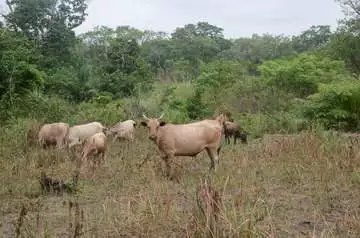
Preparing for emergencies
The cooperative is digging trenches in rows to store water. During heavy rainfall, they prevent the fields from being flooded and crops from being lost. If, on the other hand, it has not rained for a long time, the ditches form a water reservoir, explains Sewa Unisa Samura. His goal for Kaliyereh is: "The families must succeed in harvesting not just once a year, but twice. That gives them security."
Gbola Mansaray worries that the unstable fencing could undo the village's efforts. Herds of cattle could trample and eat away the crops. In Sierra Leone, grazing is allowed on open land, and to this day, the Fulani, a nomadic pastoralist people, roam the region with their herds of cattle. Conflicts increase as the population grows and land becomes scarcer and more precious. To avoid this, young people watch the cultivated fields at night. This nightwatch is not a permanent solution, but funding for fences is still lacking, and the villagers are discussing this with the project team.
A village bench under the mango tree
Back in the village, it is time for a meeting of the savings and credit group. The first residents have already sat on wooden benches and plastic chairs under the mango tree and are waiting for Gbola Mansaray to drag the large, light blue metal box out of her house. It is secured with three locks, as it contains the savings of the entire village. Every Friday, each group member deposits twelve leones, the equivalent of 55 cents, which the cashier, Foray Marah, carefully notes down. Participation in a savings group entitles you to apply for a loan, which must be repaid with interest.

The nearest bank is many hours away by car, and the rural population can only obtain a loan with collateral such as registered land. Gbola Mansaray has never been to a bank. She says she doesn't even know how they work. However, she has already used her own village bank under the mango tree twice to pay school fees for her two children, Ansumana and Kumba.
The project has an impact on many areas of everyday life. It is an opportunity for people like Gbola Mansaray, who will hopefully soon be able to say: "Life has become easier."
A report by Katrin Gänsler. She is a freelance journalist in Cotonou, Benin. She visited the WHH project in Sierra Leone in April.
An extended German version of this text was first published in the Welthungerhilfe Magazine (issue 03/2023).





